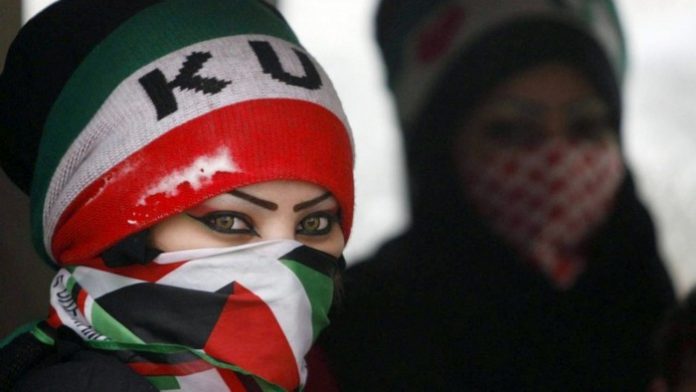Women played an important role in the social fabric of Kuwait long before the discovery of oil in the country. For hundreds of years, they were the cohesive force that bound families in close-knit tribal groups and passed on cultural traditions through generations. They were not only active in parenting and household work but were also involved in livestock rearing and weaving clothes furnishings and tents. Despite this pivotal role in the family, women had very little legal rights and were not viewed as persons with individual rights of their own.
It was only with the opening of the first private school for girls in 1926, that women had the privilege to learn reading and writing. Public schooling began in 1937 and though enrollment of girls was initially low, by 1940s many young Kuwaiti women were enrolled in primary schools.
With the modernization that began following the discovery of oil in late 1930, women in Kuwait experienced many changes to their social status. In the 1950s their access to education and employment increased dramatically, and it was often women themselves who pushed for these educational advances and opportunities. In 1956 a group of them rallied for their right to go abroad to study.
With education came a greater awareness of their role in society and in the late 1960s and early 70s there were calls and campaigns for women’s suffrage. Women frequently took their petition to parliament, which was however always rejected by the male lawmakers.
But the 1990–91 Iraqi occupation of Kuwait forever changed not only the view of women by their male counterparts but also women’s own outlook about their gender and capabilities. During the occupation, Kuwaiti women played a large role in resisting the Iraqi invasion and this period served as a catalyst for the eventual liberalization of women’s political and social rights.
Following the liberation there were louder calls for more women’s representation in the political life of the country. In 1993, Nabila Al-Mulla became the first female ambassador in the Gulf region. True political equality, however, remained elusive as the election Law continued to ban political rights for women for another decade.
In 1999, the then Amir Sheikh Jaber Al-Ahmad Al-Jaber Al-Sabah, during an interregnum of parliament, promulgated a decree granting women suffrage. However, the next duly elected parliament overturned this decision. In 2003, another government-sponsored bill that would give women the right to vote and run in municipal councils was also rejected by the parliament.
Between 2000 and 2005 a number of cases were filed in courts against the Minister of Interior for his refusal to include women in the election tables. In 2004 they took their protests to the halls of parliament and a year later held one of the largest demonstrations in Kuwait’s history.
Through the combined efforts of activists, lawyers, politicians, and everyday citizens, women were finally able to get Parliament to grant them their voting rights on 18 May, 2005. Parliament granted women their voting right by a simple amendment that removed the word ‘men’ from Article 1 of the Election Law No. 35/1962. The amendment was passed by a vote of 35 in favor and 23 against.
For the first time in Kuwait’s history, women were able to file their names as candidates in the snap elections that were called for in 2006. Though 32 women ran for parliament in this election, and 27 women stood in the 2008 election fray, none managed to secure a seat.
But through persistence and by running effective and professional campaigns women were finally able to shatter the glass ceiling and four of them made their way into parliament in the 2009 elections. The four, Massouma Al Mubarak, Aseel Al Awadhi, Rola Dashti, and Salwa Al Jassar, assured a place for themselves in the history of women’s fight for equality in Kuwait. Dr. Mubarak also became the first Kuwaiti woman to serve as a cabinet minister.
In February 2012, all four women lost their seats in parliament but the subsequent elections in December 2012 saw Masooma Al Mubarak return to parliament along with newcomers Safaa Al Hashem and Thekra Al-Rashidi. Throughout their time in parliament, women legislators were the driving force behind drafting many new labor laws, including those that stipulated regulations surrounding working conditions and workers’ rights, especially those for women.
Today, women in Kuwait are among the most emancipated in the Middle-East. Women form over 46 percent of those employed in the country and are seen in every sector of the economy and play an important role in the political and administrative life of the country. Employment rate of women in Kuwait is the highest in the MENA region and Kuwait is also ranked top among all Arab countries in the Human Development Report’s Gender Index.
Today, women in Kuwait have a far more secure position, with many laws being enforced to uphold their rights and dignity, and any form of discrimination deemed unconstitutional challenged in the courts. Kuwaiti women have also received accolades in the country and abroad for their activism as well as for their work in social endeavors and their success in various fields.
Though women in Kuwait are seeing their long history of political and social activism finally beginning to bear fruit, they need to remain vigilant against changing political scenarios that might attempt to snatch away their hard won freedom and equality.

















